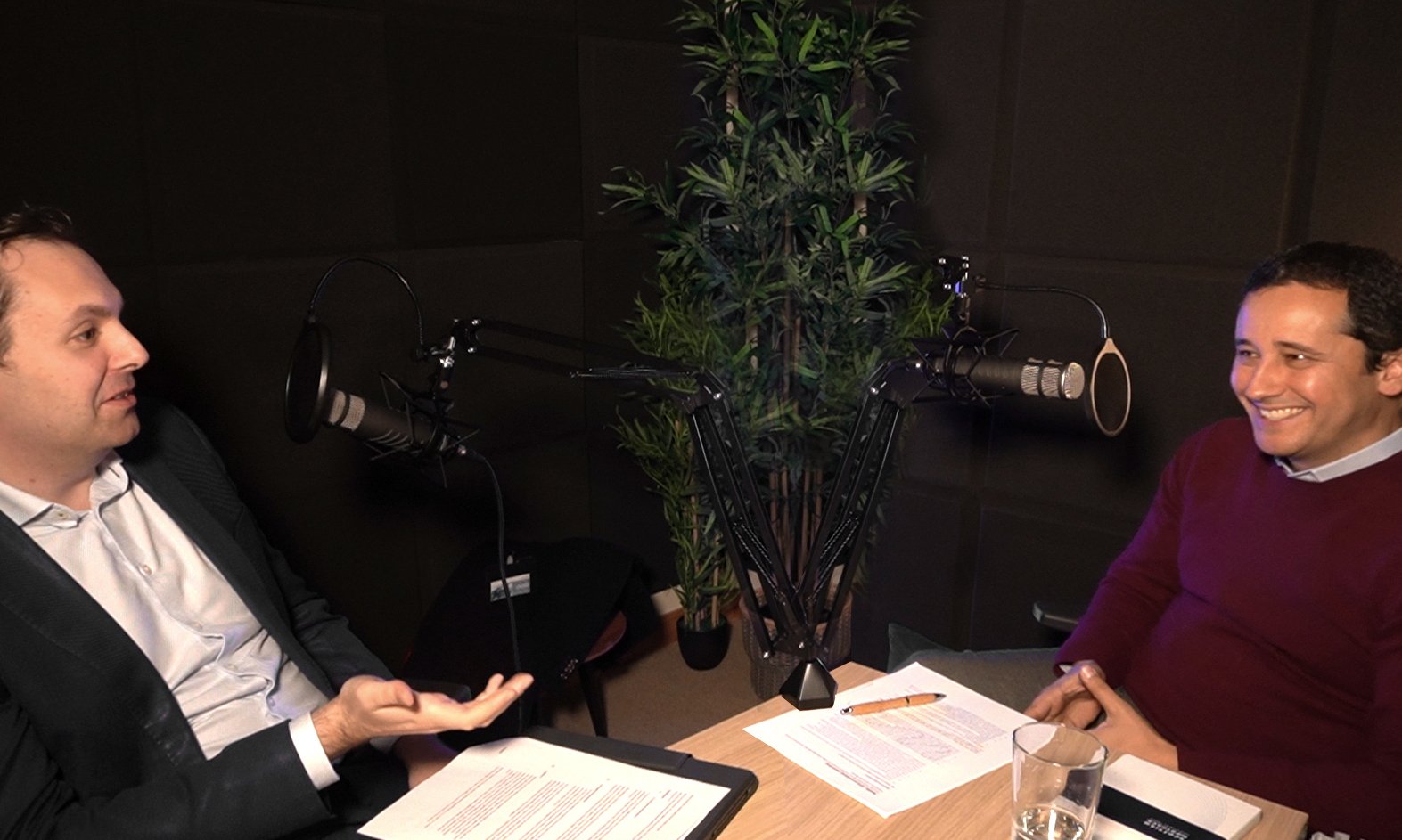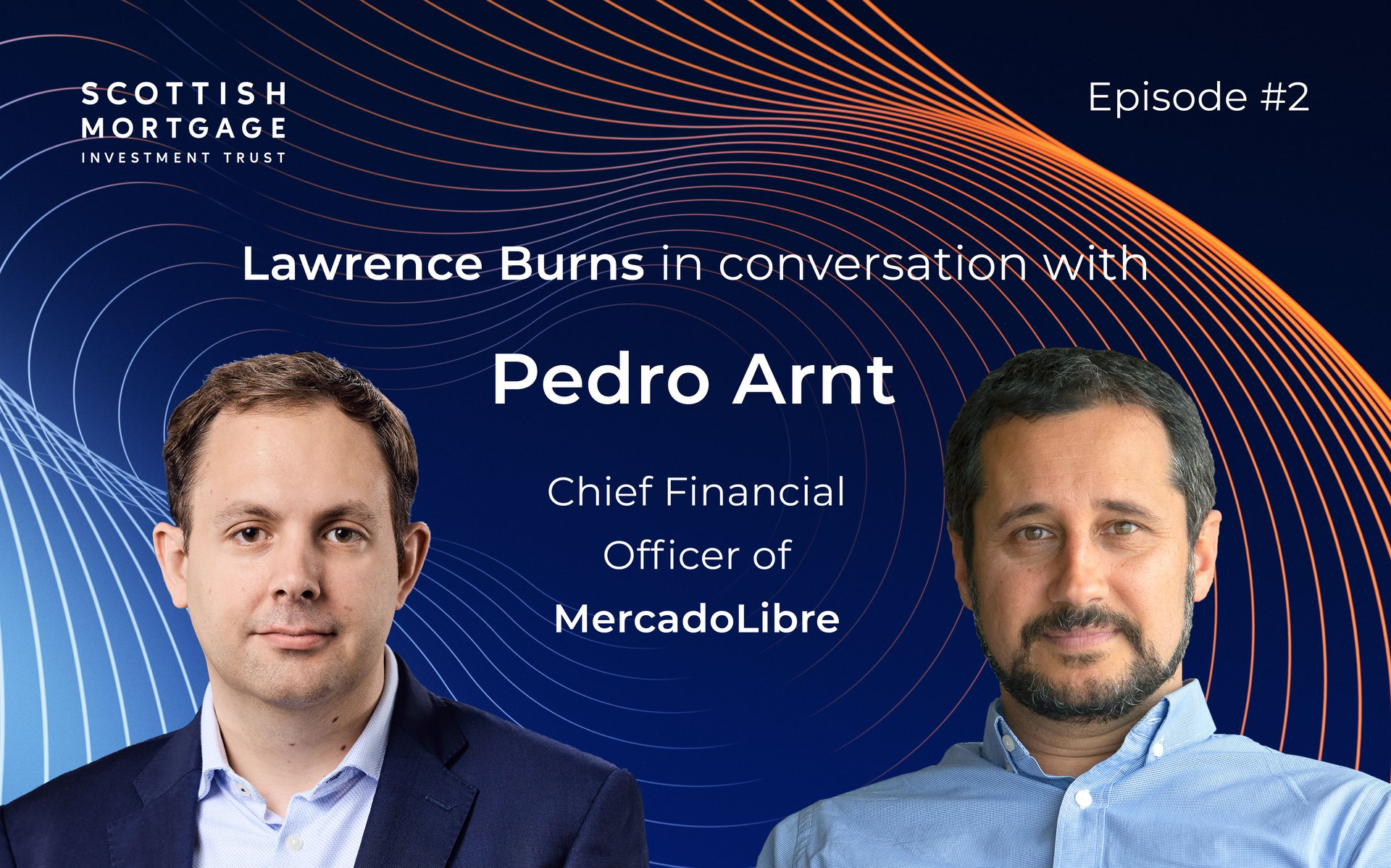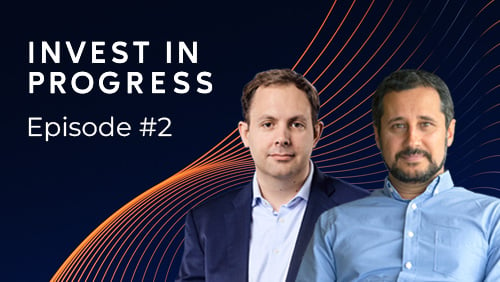February 2023
Article
5 minutes
MercadoLibre: bridging the digital divide
Claire Shaw – Portfolio Director
Key Points
- Ecommerce and fintech firm MercadoLibre is sometimes described as ‘the Amazon of Latin America’
- More than 42 million people buy goods via its online shopping platform
- And its digital financial services provide a further growth opportunity, in a region where many lack a bank account

This article is a teaser for the Scottish Mortgage MercadoLibre podcast. Hear the company’s Pedro Arnt speak to Lawrence Burns about its ambition to provide Latin America’s 650 million-strong population with financial services here.
All investment strategies have the potential for profit and loss. Your or your clients’ capital may be at risk.
Four per cent of UK adults do not have a bank account. But go to Latin America, and the figure can be significantly higher. It’s:
- 63 per cent in Mexico
- 57 per cent in Peru
- 54 per cent in Colombia
- 51 per cent in Argentina
- More than 150 million people are without an account in those four countries alone.
MercadoLibre (Meli) is Latin America’s largest online commerce and payments ecosystem. And it wants to become the region’s de facto digital bank for the ‘unbanked’ and ‘underbanked’ – people without an account and those that have one but regularly use money orders, payday loans and other alternatives instead.
Global impact
The company’s mission is to “democratise commerce and financial access”. It lends responsibly to consumers, entrepreneurs and small-to-medium enterprises. In addition, it offers insurance and other financial services.
Meli operates in a region with 650 million citizens who are increasingly using the internet.
Pedro Arnt is the company’s chief financial officer. Many on the management team have been with the company since the beginning, and he joined in 1999, its founding year.
“Part of what attracted us to building MercadoLibre together was not just the opportunity to disrupt retail and then eventually disrupt finance,” he explains. “It was, let’s build something out of Latin America that is on par in terms of how it’s run and the global impact it can have, as many of the multinational companies that typically came to dominate the region.”
He adds that believing “in the transformational power of technology” helped him and his colleagues keep innovating while they waited for the consumer internet to become mainstream.
Today, Meli’s online marketplace receives 668 million visits per month. That’s four times Amazon’s traffic in Latin America.

Enjoy investment manager Lawrence Burns’s entire conversation with Pedro Arnt on the Scottish Mortgage podcast. Hear how MercadoLibre continues to expand its markets, de-risk innovation, and promote social inclusion. Learn more about the relationship between business purpose and social impact and why that matters.
Innovation at the core
So, how did MercadoLibre do it, when Amazon hasn’t been able to get close?.
Arnt says two questions guided the company’s approach to innovation over the past two decades. The first asks: “How do we continue to innovate on our existing core business?”
He points to logistics as a way it’s sought to respond. “For the first 15 years of this company, touching physical inventory was an anathema,” Arnt says. “What we initially had built was a purely asset-light model, where the beauty of it was that we never touched inventory, we never touched products.”
Six or seven years ago, he adds, the management team realised that to keep growing, “logistics was going to be critical to the user experience we had to go all in”.
Today, Arnt says, MercadoLibre runs “the most efficient ecommerce logistics network in Latin America”.
New avenues of growth
The second question the firm asks itself is: “What are the new avenues of growth?”
Here, management is looking for opportunities that complement each other and extend the existing business. The firm’s move into digital financial services is one example of this.
“We’ve found a somewhat repeatable model for innovation that de-risks a lot of the new things we approach,” Arnt explains. This involves breaking down the company’s approach into three steps:
- Identifying an addressable market where the scale of opportunity is large enough to warrant the risk of trying to build a business around it.
- Launching at speed to a limited number of users and iterating based on the feedback they provide. Then gradually expand the service to others.
- Only presenting the product to the open market once enough work has been done to improve quality and create a competitive cost structure.
Arnt confirms that the same logic applies whether the company is designing a new product or entering a new industry. “It allows us to kill things that aren’t working way before we’ve over-allocated capital,” he adds.
Day-one Latin America
Despite MercadoLibre’s success, the firm believes most of its growth lies ahead. Arnt describes it as operating under a “day-one mentality”, borrowing Jeff Bezos’ phrase for the start-up mindset, where companies remain nimble despite getting bigger, because they are willing to take calculated risks and make decisions quickly.
“It’s early stage for ecommerce in Latin America,” he explains. “As we continue improving technological interfaces and experiences, we can unlock much of what eventually drives online retail penetration towards developed market levels.”
That also holds true for the credit and payment facilities Meli intends to become new engines of growth.
“The interaction between payments and commerce is much more relevant in emerging markets than developed markets,” Arnt adds.
One of the strengths the company can draw on is the vast amounts of data it’s gathered from its millions of customers and merchants. Meli’s financial products provide a simple, affordable way to access financial transactions and savings and credit solutions, many for the first time.
Arnt suggests Meli will capture further financial inclusion opportunities by combining its technological capabilities and assets in other ways. “There are many things that I think leave us optimistic in terms of competitive dynamics going forward, even with the most fearsome of competitors, such as Amazon,” he says.
The trust invests in overseas securities. Changes in the rates of exchange may also cause the value of your investment (and any income it may pay) to go down or up.
About the author - Claire Shaw
Portfolio Director
Claire Shaw is a portfolio director and plays a prominent role in servicing Scottish Mortgage’s UK shareholder base. Before joining in 2019, she spent over a decade as a fund manager with a focus on managing European equity portfolios for a global client base. With a background in analysing companies and communicating investment ideas, Claire is also responsible for creating engaging content that makes the Scottish Mortgage portfolio accessible to all its shareholders. Beyond that, she works closely with the managers, meeting with portfolio companies and conducting in-depth portfolio discussions with shareholders.
Important information
This communication was produced and approved at the time stated and may not have been updated subsequently. It represents views held at the time of production and may not reflect current thinking.
This content does not constitute, and is not subject to the protections afforded to, independent research. Baillie Gifford and its staff may have dealt in the investments concerned. The views expressed are not statements of fact and should not be considered as advice or a recommendation to buy, sell or hold a particular investment.
Baillie Gifford & Co and Baillie Gifford & Co Limited are authorised and regulated by the Financial Conduct Authority (FCA). The investment trusts managed by Baillie Gifford & Co Limited are listed on the London Stock Exchange and are not authorised or regulated by the FCA.
A Key Information Document is available by visiting our Documents page.
Any images used in this content are for illustrative purposes only.




